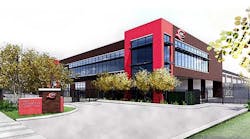Data center activity is accelerating in the Greater Atlanta market, with strong leasing in the third quarter and a substantial expansion for the region’s largest hyperscale campus.
In recent earnings announcements, both QTS Data Centers and Switch reported leasing successes in Atlanta in the third quarter.
Atlanta has been a hot market for data center development in recent years, seeing new projects from providers targeting the enterprise market, as well as a healthy stream of sale-leaseback transactions. The latest leasing and expansion activity suggest that the region’s data center market growth, which has been somewhat uneven, is gaining momentum.
Atlanta had 7.8 megawatts of data center absorption in the first half of 2020, according to data from CBRE. The real estate and research firm says Atlanta is the seventh-largest market in the U.S. with about 151 megawatts (MWs) of inventory, trailing Northern Virginia, Dallas, Silicon Valley, Chicago, Phoenix and just behind the New York/New Jersey region.
QTS Data Centers
QTS has the largest market presence on Atlanta, and leased an additional 8 megawatts to an existing hyperscale customers at its new Atlanta data center, which was announced in 2019 and opened for business during the third quarter.
“Including this new commitment, we’ve now preleased more than 24 megawatts in the new Atlanta facility,” said Chad Williams, the CEO and President of QTS Data Centers, on the company’s recent earnings call. “That’s a historic number for QTS. We’ve never opened a building with that type of leasing.”
QTS says its primary Metro data center – a massive 970,000 square foot building with 500,000 square feet of finished space – is “near fully occupied.” The new building provided an opportunity to deliver hyperscale capacity on a new 76-acre campus that can support as much as 120 acres of data center development.
The new Atlanta campus “is a derisked opportunity because we’ve got 500 customers now that can grow and see a very visible path,” said Williams. “We are pleased with the strong level of preleasing in the site and look forward to extending our market leadership position.”
Switch
Switch said it has signed a new anchor customer for The Keep, the company’s new data center campus in suburban Atlanta, which was announced in 2017 and opened for business in early 2019. The new tenant is one of the largest U.S. private health insurers, and will bring the first phase of The Keep to 66 percent committed, Switch President Thomas Morton said in the earnings call. Switch also said it is finalizing tenant improvements on Sector 2 of Atlanta Data Center 1 adding 780 cabinet equivalents.
The Keep is one of the four “Prime” campuses for Switch, along with Las Vegas, Reno and Michigan.
“We continue to be very excited about our progress in the Atlanta Prime,” said Morton. “We have over 20 customers there right now, so we are very pleased with the progress of the Atlanta estate and very, very pleased to have this anchor tenant in place.
We believe that Atlanta will take off and will get going,” Moron added. “It’s doing very well as a single building right now and it is very profitable. When we start to land additional anchors there or have interest for large megawatt deployments we will quickly deploy. We have permits to go deploy and the construction abilities to build as soon as there is a sufficient need.”
Switch Chief Financial Officer Gabe Nacht said the Atlanta deal was among a series of customer wins in the healthcare sector, which has become a key focus during the COVID-19 pandemic.
“We’ve been making a very concerted effort to target health care companies because of our resiliency, our security, all of the regulatory compliance that we have,” said Nacht. “We think we’re a fantastic home for health care companies, and that’s clearly showing up in our sales report.”
Facebook and Beyond
It’s been a good year for the data center business in Georgia. Facebook said in September that it will invest $1 billion to add three huge data center buildings to its campus in Newton County. The construction project will add 1.5 million square feet of capacity to the campus, which broke ground and is scheduled to open its first phase this year.
- In 2019 Flexential opened a new data center in Alpharetta, north of Atlanta, with 175,000 square feet of space.
- DataBank has launched an innovative new data center in Downtown Atlanta, which houses a supercomputer and advanced computing lab, and will reuse of server waste heat and include a microgrid to provide access to multiple sources of energy.
- Digital Realty, the world’s largest data center landlord, has expanded its presence downtown by adding 18,000 square feet of raised-floor colocation space in 250 Williams, a multi-tenant data center facility in downtown Atlanta.
Because of its strong enterprise sector, Atlanta has also been a leading venue for sale-leaseback deals in which providers acquire underutilized enterprise facilities and converting them to multi-tenant operations.
In a sale-leaseback transaction, an enterprise company sells its data center to a third-party, and then leases the space it needs to operate its existing IT facilities. The buyer, usually an investor or data center service provider, collects the rent and can lease the remaining space.
This type of deal solves a common problem. An enterprise company builds a large data center, assuming its IT operations will grow. It winds up not needing as much space as it expected, due to increased use of virtualization or third-party cloud computing services. As a result, large expanses of expensive data center space sit empty.
About the Author



